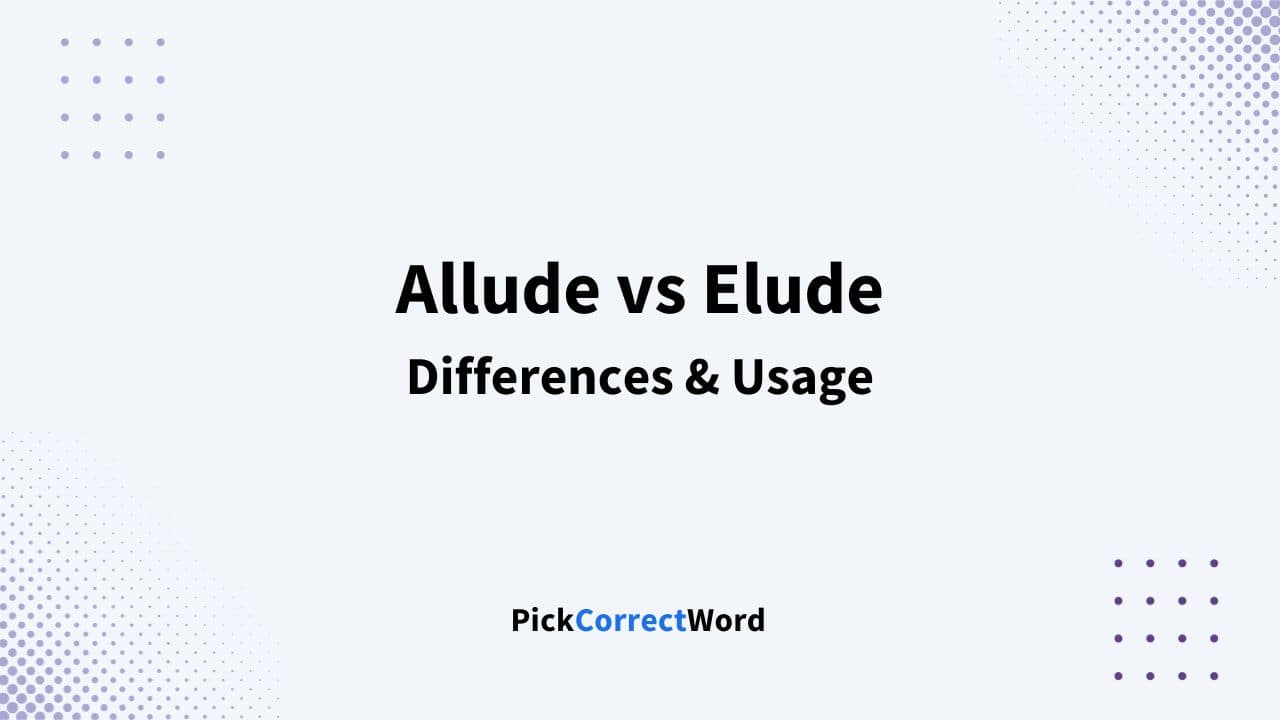Allude and elude are words that sound alike but mean different things. Lots of people get these two words mixed up because they sound the same and have similar meanings.
Both words should be used with care and in different situations, though, because they mean very different things.
Allude means to refer to something in an indirect way
Elude means to avoid or escape from something or someone, often in a skillful or cunning way.
As these words differ by just one letter and have closely related meanings, it can be easy to confuse them, especially since their pronunciation also varies.
Allude Vs. Elude: Quick glance table of differences
| Term | Meaning | Part of Speech | Pronunciation | Synonyms | Antonyms |
| Allude | To indirectly reference something. | Verb | uh-lood | Suggest, imply | Specify, cite |
| Elude | To escape from or avoid a threat or grasp; avoid understanding. | Verb | i-lood | Evade, dodge | Confront, face |
Allude Vs. Elude: Meaning and Differences
When you use the word “allude”, you’re subtly hinting at something without explicitly stating it.
On the other hand, when you use “elude”, you’re conveying the act of smartly avoiding capture or comprehension.
Allude
Definition: The verb “allude” refers to the act of mentioning something indirectly or hinting at something without stating it explicitly.
- Part of speech: Verb
- Example: In her speech, she alluded to her mentor’s influence without naming him.
Elude
Definition: “Elude” describes the ability of a person or thing to evade or escape from someone or something.
- Part of speech: Verb
- Example: The fugitive eluded capture by changing his appearance.
Examples of using Allude in a sentence
“She didn’t directly mention the issue, but she did allude to it in her speech.“
“The author likes to allude to classic literature in his writing.“
“The comedian alluded to a popular movie in his stand-up routine.“
“The teacher alluded to the upcoming test during class.“
“The politician carefully alluded to his opponent’s scandals without directly mentioning them.“
“The detective alluded to a possible suspect in the investigation.“
“The singer alluded to her personal struggles in her latest album.“
“The artist’s painting seemed to allude to a famous historical event.“
“The professor alluded to a relevant study during the lecture.“
“The advertisement cleverly alluded to the benefits of the product without explicitly stating them.“
Examples of using Elude in a sentence
“The criminal managed to elude the police for weeks.“
“The answer continued to elude her despite her efforts to solve the problem.“
“The elusive bird seemed to elude the birdwatchers’ attempts to capture it on film.“
“The truth about the incident seemed to elude everyone involved.“
“The solution to the puzzle continued to elude the participants.“
“The fugitive managed to elude capture by constantly changing locations.“
“The cat tried to catch the mouse, but it always managed to elude her.“
“The meaning of the poem seemed to elude the students.“
“The key to success in the project seemed to elude the team.“
“The final piece of the jigsaw puzzle continued to elude the puzzler.“
Synonyms for ‘Allude’ and ‘Elude’
The synonyms for ‘allude’ and ‘elude’ are listed in the table below.
| Synonyms for ‘Allude’ | Antonyms for ‘Elude’ |
| imply | avoid |
| suggest | evade |
| hint | dodge |
| infer | escape |
| refer | shake |
Frequently Asked Questions
What are the distinct meanings of allude and elude?
When you allude to something, you’re referring to it in a roundabout way, without saying it directly. But to elude means to get away from something or avoid it, usually in a smart or skilled way.
How can you use allude and elude correctly in a single sentence?
In the novel, the character eludes his pursuers through the crowded streets while alluding to his secret past, which hints at motivations yet to be revealed.
What is the proper context for using the word allude?
The word allude is appropriately used in contexts where an indirect mention or subtle hint is intended, such as in academic writing or in everyday conversation when referring to something without naming it.


